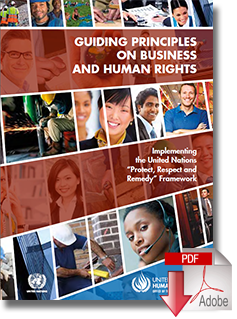How Much Do You Want To Know About Your Own Company Supply Chain?

Companies would be wise to ensure that all suppliers have gone through due diligence before signing a contract.
Recently, a Toronto-based law firm filed a class action lawsuit of $2 billion in damages against a major retailer in Canada in relation to the 2013 Rana Plaza Bangladesh garment factory collapse, in which over 1,000 people lost their lives and over 2,500 were gravely injured.
The lawsuit alleged that the retailers had prior knowledge about the “extremely poor record” of workplace safety and industrial building standards in Bangladesh.
The allegations also claim that the retailer was aware of the “significant and specific risk” to workers who manufactured the brand’s garments and whom their subcontractors in Bangladesh employed.
In France, a proposed law seeks to make parent companies liable for human rights’ violations as well as health and environmental damages committed abroad by subsidiaries and suppliers.
This could represent a civil and criminal liability if breaching the duty of care of at least taking preventive measures to prevent the damage to occur.
Lawsuits as well as new potential laws, such as the French proposal, puts a new form of spotlight on the complex issue of supply chain governance, human rights due diligence and now the growing question of legal risks and liabilities.
The French Law Commission “Duty of Care”

The Bill on the duty of care in relation to subsidiaries and sub-contractors of French companies, which, if adopted, would become one of the most progressive legislation regarding corporate accountability for human rights violations, has been rejected by the French Law Commission (‘commission des lois’).
Human rights and environmental problems in the supply chain have been in and out of the spotlight since the mid-1990s when public campaigns began to be directed at big brands for selling products made under poor conditions in supply chains, mainly in developing countries.
This changed the public opinion about the responsibility of global firms towards their supply chains, including the opinion of shareholders who wanted to hold companies to “higher standards” as compared to the limited existing laws and regulations in the countries of operation. At that time, media stories and public judgement was the main concern for the C-suite and the Boards of Directors. Bad publicity affected the reputation and the sales of the company’s products.
As a result of the growing media spotlight and greater interest in what is going on in the supply chain, most large companies today have a more or less sophisticated responsible supply chain program. The key components in such a responsible supply chain management program is:
- Having a code of conduct describing what is expected from the supplier.
- Having an investigation process (via questionnaires and/or on-site visits/audits) of the risks of suppliers’ non-compliance with the code of conduct.
- Implementing improvement programs. Companies who have found child-labor or other “non-acceptable” factors in their supply-chain have been told by stakeholders that the right thing is to continue the relationship with the supplier and work to improve the situation. And only in cases where the supplier is not willing to improve, all business with the supplier should be stopped.
- Conducting training sessions and working with other businesses to improve the situation in order to have a greater positive impact.
Although progress has been made, working conditions in supply chains around the world and across industries are still not on par with most of the western world. Conducting supplier audits, human rights due diligence and continuous improvements are of critical importance for the workers, the environment and the reputation of the company.
Facing this situation, companies are caught between a hard place and a rock. On the one hand, conducting supplier visits and human rights due diligence might lead to the discovery of facts that might increase the company’s exposure to liability claims. On the other hand, not taking action can result in reputational risks, and hit sales and stocks hard and is also out-of-line with the values and policies of many companies.
In light of companies facing lawsuits for having knowledge about the conditions in their supply chain, the following questions arise: Are companies exposing themselves to more potential public judgement or lawsuit claims by keeping an eye on their social and environmental impact in their supply chains? Does conducting supplier visits or human rights due diligence increase a company’s risk of liability and allegations? How much can or should the companies get involved, what actions must they take, and how can they improve the situation without putting themselves at risk for lawsuits?
The new French law proposal requires companies to establish a “duty of care roadmap” that prevents human rights violations as well as environmental damages and at least take preventive measures to prevent the damage to occur.
In a report to the U.N. Human Rights Council, Professor John G. Ruggie articulated his well-known “Protect, Respect, and Remedy” Framework. The framework outlines that the business responsibility to respect human rights requires companies to conduct human rights due diligence (see sidebar below).
This means adopting a human rights policy, conducting human rights due diligence, integrating the policy into the company’s operations and culture, and tracking and monitoring performance. Human rights due diligence is prudent as ever because it allows companies to identify potential human rights risks before they occur, which should therefore reduce companies exposure to litigation and help companies defend human rights claims that might be filed. However, what to do if the non-compliance has happened?
Companies can and should not shy away from knowing about the conditions in their supply chain - on the contrary, they should put even more focus on this aspect - and demand that their suppliers and sub-suppliers do the same. It is also vital for the C-suite and the Board of Directors to get involved by:
- Discussing the criteria and the code of the conduct for their own facilities as well as those of suppliers. It is essential to ask questions such as: What kind of suppliers do we as a company want? Are we willing to pay more? And therefore, can we ask our customers to pay more?
- Discussing the underlying reasons for why suppliers don’t comply with environmental and social standards - is it due to the lack of knowledge and training? Or is it because the company is forcing the suppliers to cut corners due to short delivery-notices, setting unreasonably low prices for the goods they supply, or simply that the suppliers do not care? (If it is the latter, then the relationship should be discontinued).
- Discussing the key actions and the reports that the board would like to receive in order to perform the needed oversight.
- Discussing what actions to take internally and towards the supplier when different forms of non-compliance issues are identified.
Companies will benefit from ensuring that all potential suppliers have gone through a due-diligence process before a contract is signed. In this way the company can engage with suppliers that meet the expectations from the management team and the Board of Directors as well as future legislation.
By holding themselves and their suppliers to a higher standard, companies will reduce the risk of having to receive negative comments about the conditions of the suppliers in the media or a civil or criminal liability case in the courtroom.
Supply chain governance issues, human rights due diligence and all sustainability matters require the board to stay informed and take action. As the saying goes, “What gets measured gets managed.”
Source: GreenBiz
New Guiding Principles on Business and Human Rights endorsed by the UN Human Rights Council
In an unprecedented step, the United Nations Human Rights Council has endorsed a new set of Guiding Principles for Business and Human Rights* designed to provide for the first time a global standard for preventing and addressing the risk of adverse impacts on human rights linked to business activity.
“The Council’s endorsement establishes the Guiding Principles as the authoritative global reference point for business and human rights,” said John Ruggie, the Secretary-General’s Special Representative for Business and Human Rights. “They will also provide civil society, investors and others the tools to measure real progress in the daily lives of people.”
The Guiding Principles are the product of six years of research led by Professor Ruggie from Harvard University, involving governments, companies, business associations, civil society, affected individuals and groups, investors and others around the world. They are based on 47 consultations and site visits in more than 20 countries; an online consultation that attracted thousands of visitors from 120 countries; and voluminous research and submissions from experts from all over the world.
The new standards outline how States and businesses should implement the UN “Protect, Respect and Remedy” Framework in order to better manage business and human rights challenges.
Under the ‘State Duty to Protect,’ the Guiding Principles recommend how governments should provide greater clarity of expectations and consistency of rule for business in relation to human rights. The ‘Corporate Responsibility to Respect’ principles provide a blueprint for companies on how to know and show that they are respecting human rights. The ‘Access to Remedy’ principles focus on ensuring that where people are harmed by business activities, there is both adequate accountability and effective redress, judicial and non-judicial.
In giving its endorsement, the Human Rights Council commended Professor Ruggie for developing the UN “Protect, Respect and Remedy” Framework, and recognized the role of the Guiding Principles in providing comprehensive recommendations for its implementation.
The Special Representative’s mandate was created in 2005 by the then UN Commission on Human Rights (now Human Rights Council) in order to move beyond what had been a long-standing and deeply divisive debate over the human rights responsibilities of companies. Professor Ruggie, of Harvard University, was appointed to the position by Kofi Annan, UN Secretary-General at the time, and was extended in his role by current Secretary-General Ban Ki-moon. His aim was to build meaningful consensus among all stakeholders about the roles and responsibilities of both States and companies with regard to business’s impacts on human rights. To achieve that consensus, he conducted extensive research and convened consultations around the world.
Source: United Nations Human Rights
Download the Paper: Guiding Principles on Business and Human Rights
Related: U.S. Representatives Propose Supply Chain Law Following Slavery Report

Article Topics
GreenBiz News & Resources
The Road to Sustainable Urban Logistics Starbucks Future Includes More Mobile, More Food, More China, and More Veterans The Growth of the Circular Economy First UPS U.S. Delivery eBike Debuts in Portland, Ore Starbucks Unveils Plans for 12000 New Stores over Next 5 Years, New Roastery & Reserve Stores How Do You Like Your (Sustainable) Coffee? Starbucks Bringing Leading Italian Artisan Bakery and Food Purveyor Princi to Its Food Supply Chain More GreenBizLatest in Supply Chain
Is the Trailers as a Service (TaaS) Model Right For Your Business? Why Grocery Shoppers are Leaving Stores and Buying Their Food Online Is There a Next Generation of Truckers? Data Reveals Grim Outlook A Look at Baltimore’s Key Bridge Collapse—One Month Later European Parliament Passes Law on Supply Chain Accountability Baltimore Continues Bridge Recovery With Opening of New Channel How Shippers Can Prep for Hurricane Season More Supply Chain















